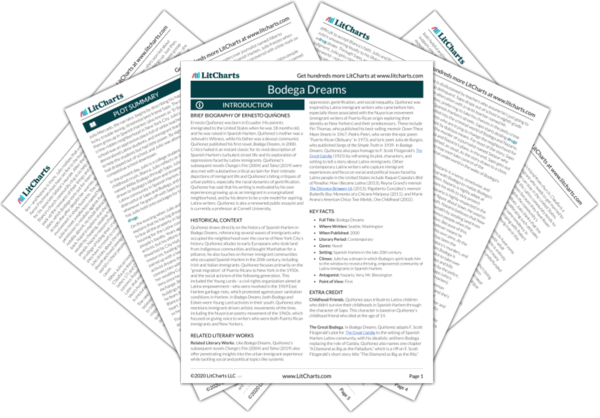Various characters’ dealings with illicit drugs symbolize the ways in which Spanish Harlem’s residents are systemically oppressed and effectively forced to break the law. Julio’s best friend, Sapo, drops out of middle school and starts dealing drugs after he’s provoked into a fight with a racist teacher. Years later, selling drugs is seemingly Sapo’s only option to earn a sufficient living. After all, Julio is a high school graduate and college student, yet he still struggles to make ends meet with his low-paying job at a grocery store. Sapo’s life of crime thus represents the general lack of opportunity and economic desperation that young Latinx people face as the education system consistently overlooks or antagonizes them. Sapo even ropes Julio into his dealings, occasionally asking him to look after or deliver packages that almost certainly contain drugs. Julio’s reluctant yet steadfast support of Sapo in this way reflects the unfortunate reality that people in Spanish Harlem are often forced to choose between abiding by the law or remaining loyal to one’s friends.
Further, when City Halls refuses to aid antihero Willie Bodega in helping allocate more resources to the neighborhood, Bodega is forced to resort to running heroin (among other criminal endeavors) in order to fund his charitable work. Again, an otherwise staunchly moral and altruistic man resorting to drug-dealing symbolizes the ways in which the system neglects and marginalizes entire Latinx communities. Good people like Bodega are more or less forced to turn to lives of crime if they want to bring about lasting change. In this way, the drugs that circulate in Spanish Harlem aren’t solely an indicator of crime and degeneracy—they’re a marker of people desperately trying to better themselves and their fellow residents in the only way they can.
Drugs Quotes in Bodega Dreams
My father understood where we were living. He knew, and when I would come home with bruises or a black eye he never lost his cool. I liked my father, and my father liked Sapo. He knew the importance of having someone there to watch your back. It was important to have a pana, a broqui.

Unlock explanations and citation info for this and every other Bodega Dreams quote.
Plus so much more...
Get LitCharts A+“The next day we went to City Hall and filed our demands. And you know what happened the next month, Chino? […] The next month, they hiked the subway fare from twenty-five cents to thirty-five cents. […] So we waited, and we waited, and we filed and we filed. Finally, when we knew our demands weren't going to be met, when we knew […] the sanitation department wouldn't even lend us brooms to clean our streets, we had no choice but to take over the streets of East Harlem.”
If Sapo killed that reporter then he deserved to go to jail. I thought that, but I knew I didn’t mean it. I felt bad for Sapo. I also knew I would never rat out Sapo or Bodega. I wasn’t going to say a word.












